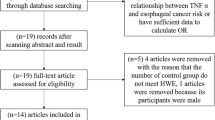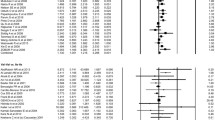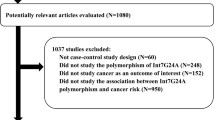Abstract
Many studies have reported the role of COMT Val158Met with breast cancer risk, but the results remained controversial. In addition, previous meta-analysis on COMT Val158Met showed conflicting results. Hence, we performed a meta-analysis to investigate the association between breast cancer and COMT Val158Met (30,199 cases and 38,922 controls) in different inheritance models. When all the eligible studies were pooled into this meta-analysis, there was no evidence of significant association between breast cancer risk and COMT Val158Met polymorphism in any genetic model (dominant model: odds ratio [OR] = 0.99, 95% confidence interval [CI] = 0.94–1.04, P value of heterogeneity test [P h] = 0.009, I 2 = 36.9%; recessive model: OR = 0.97, 95% CI = 0.92–1.02, P h = 0.044, I 2 = 28.6%; additive model: OR = 0.98, 95% CI = 0.91–1.05, P h = 0.004, I 2 = 40.4%). However, significant between-study heterogeneity was detected in any genetic model. Hence, we performed the stratified analysis according to ethnicity, source of controls, menopausal status, and family history. In the stratified analysis by ethnicity significantly decreased breast cancer risk was observed in Caucasian population (recessive model: OR = 0.96, 95% CI = 0.92–1.00, P h = 0.419, I 2 = 3.1%). In conclusion, this meta-analysis indicates that COMT Val158Met polymorphism may be associated with decreased breast cancer risk in Caucasian population. However, a study with the larger sample size is needed to further evaluated gene-environment interaction on COMT Val158Met polymorphisms and breast cancer risk.



Similar content being viewed by others
References
Berns EM, van Staveren IL, Look MP, Smid M, Klijn JG, Foekens JA (1998) Mutations in residues of TP53 that directly contact DNA predict poor outcome in human primary breast cancer. Br J Cancer 77:1130–1136
Parkin DM, Bray F, Ferlay J, Pisani P (2001) Estimating the world cancer burden: globocan 2000. Int J Cancer 94:153–156
McPherson K, Steel CM, Dixon JM (2000) ABC of breast diseases. Breast cancer epidemiology, risk factors, and genetics. BMJ 321:624–628
Sim X, Ali RA, Wedren S, Goh DL, Tan CS, Reilly M (2006) Ethnic differences in the time trend of female breast cancer incidence: Singapore, 1968–2002. BMC Cancer 6:261
de Jong MM, Nolte IM, te Meerman GJ, van der Graaf WT, Oosterwijk JC (2002) Genes other than BRCA1 and BRCA2 involved in breast cancer susceptibility. J Med Genet 39:225–242
Dunning AM, Healey CS, Pharoah PD, Teare MD, Ponder BA (1999) A systematic review of genetic polymorphisms and breast cancer risk. Cancer Epidemiol Biomarkers Prev 8:843–854
Guldberg HC, Marsden CA (1975) Catechol-O-methyl transferase: pharmacological aspects and physiological role. Pharmacol Rev 7:419–424
Dawling S, Roodi N, Mernaugh RL, Wang X, Parl FF (2001) Catechol-O-methyltransferase (COMT)-mediated metabolism of catechol estrogens: comparison of wild-type and variant COMT isoforms. Cancer Res 61:6716–6722
Goodman JE, Jensen LT, He P, Yager JD (2002) Characterization of human soluble high and low activity catechol-O-methyltransferase catalyzed catechol estrogen methylation. Pharmacogenetics 12:517–528
Lavigne JA, Helzlsouer KJ, Huang HY, Strickland PT, Bell DA, Selmin O, Watson MA, Hoffman S, Comstock GW, Yager JD (1997) An association between the allele coding for a low activity variant of catechol-O-methyltransferase and the risk for breast cancer. Cancer Res 57:5493–5497
Millikan RC, Pittman GS, Tse CK, Duell E, Newman B, Savitz D, Moorman PG, Boissy RJ, Bell DA (1998) Catechol-O-methyltransferase and breast cancer risk. Carcinogenesis 19:1943–1947
Thompson PA, Shields PG, Freudenheim JL, Stone A, Vena JE, Marshall JR, Graham S, Laughlin R, Nemoto T, Kadlubar FF, Ambrosone CB (1998) Genetic polymorphisms in catechol-O-methyltransferase, menopausal status, and breast cancer risk. Cancer Res 58:2107–2110
Huang CS, Chern HD, Chang KJ, Cheng CW, Hsu SM, Shen CY (1999) Breast cancer risk associated with genotype polymorphism of the estrogen-metabolizing genes CYP17, CYP1A1, and COMT: a multigenic study on cancer susceptibility. Cancer Res 59:4870–4875
Bergman-Jungestrom M, Wingren S (2001) Catechol-O-methyltransferase (COMT) gene polymorphism and breast cancer risk in young women. Br J Cancer 85:859–862
Goodman JE, Lavigne JA, Wu K, Helzlsouer KJ, Strickland PT, Selhub J, Yager JD (2001) COMT genotype micronutrients in the folate metabolic pathway and breast cancer risk. Carcinogenesis 22:1661–1665
Hamajima N, Matsuo K, Tajima K, Mizutani M, Iwata H, Iwase T, Miura S, Oya H, Obata Y (2001) Limited association between a catechol-O-methyltransferase (COMT) polymorphism and breast cancer risk in Japan. Int J Clin Oncol 6:13–18
Mitrunen K, Jourenkova N, Kataja V, Eskelinen M, Kosma VM, Benhamou S, Kang D, Vainio H, Uusitupa M, Hirvonen A (2001) Polymorphic catechol-O-methyltransferase gene and breast cancer risk. Cancer Epidemiol Biomarkers Prev 10:635–640
Yim DS, Parkb SK, Yoo KY, Yoon KS, Chung HH, Kang HL, Ahn SH, Noh DY, Choe KJ, Jang IJ, Shin SG, Strickland PT, Hirvonen A, Kang D (2001) Relationship between the Val108/158Met polymorphism of catechol-O-methyl transferase and breast cancer. Pharmacogenetics 11:279–286
Kocabas NA, Sardas S, Cholerton S, Daly AK, Karakaya AE (2002) Cytochrome P450 CYP1B1 and catechol-O-methyltransferase (COMT) genetic polymorphisms and breast cancer susceptibility in a Turkish population. Arch Toxicol 76:643–649
Comings DE, Gade-Andavolu R, Cone LA, Muhleman D, Mac-Murray JP (2003) A multigene test for the risk of sporadic breast carcinoma. Cancer 97:2160–2170
Tan W, Qi J, Xing DY, Miao XP, Pan KF, Zhang L, Lin DX (2003) Relation between single nucleotide polymorphism in estrogen-metabolizing genes COMT, CYP17 and breast cancer risk among Chinese women. Zhonghua Zhong Liu Za Zhi 25:453–456
Wedren S, Rudqvist TR, Granath F, Weiderpass E, Ingelman-Sundberg M, Persson I, Magnusson C (2003) Catechol-O-methyltransferase gene polymorphism and post-menopausal breast cancer risk. Carcinogenesis 24:681–687
Wu AH, Tseng CC, Van Den Berg D, Yu MC (2003) Tea intake, COMT genotype, and breast cancer in Asian–American women. Cancer Res 63:7526–7529
Ahsan H, Chen Y, Whittemore AS, Kibriya MG, Gurvich I, Senie RT, Santella RM (2004) A family-based genetic association study of variants in estrogen-metabolism genes COMT and CYP1B1 and breast cancer risk. Breast Cancer Res Treat 85:121–131
Dunning AM, Dowsett M, Healey CS, Tee L, Luben RN, Folkerd E, Novik KL, Kelemen L, Ogata S, Pharoah PD, Easton DF, Day NE, Ponder BA (2004) Polymorphisms associated with circulating sex hormone levels in postmenopausal women. J Natl Cancer Inst 96:936–945
Sazci A, Ergul E, Utkan NZ, Canturk NZ, Kaya G (2004) Catechol-O-methyltransferase Val 108/158 Met polymorphism in premenopausal breast cancer patients. Toxicology 204:197–202
Cheng TC, Chen ST, Huang CS, Fu YP, Yu JC, Cheng CW, Wu PE, Shen CY (2005) Breast cancer risk associated with genotype polymorphism of the catechol estrogen-metabolizing genes: a multigenic study on cancer susceptibility. Int J Cancer 113:345–353
Le Marchand L, Donlon T, Kolonel LN, Henderson BE, Wilkens LR (2005) Estrogen metabolism-related genes and breast cancer risk: the multiethnic cohort study. Cancer Epidemiol Biomarkers Prev 14:1998–2003
Lin WY, Chou YC, Wu MH, Jeng YL, Huang HB, You SL, Chu TY, Chen CJ, Sun CA (2005) Polymorphic catechol-O-methyltransferase gene, duration of estrogen exposure, and breast cancer risk: a nested case–control study in Taiwan. Cancer Detect Prev 29:427–432
Lin SC, Chou YC, Wu MH, Wu CC, Lin WY, Yu CP, Yu JC, You SL, Chen CJ, Sun CA (2005) Genetic variants of myeloperoxidase and catechol-O-methyltransferase and breast cancer risk. Eur J Cancer Prev 14:257–261
Modugno F, Zmuda JM, Potter D, Cai C, Ziv E, Cummings SR, Stone KL, Morin PA, Greene D, Cauley JA (2005) Estrogen metabolizing polymorphisms and breast cancer risk among older white women. Breast Cancer Res Treat 93:261–270
Wen W, Cai Q, Shu XO, Cheng JR, Parl F, Pierce L, Gao YT, Zheng W (2005) Cytochrome P450 1B1 and catechol-O-methyltransferase genetic polymorphisms and breast cancer risk in Chinese women: results from the shanghai breast cancer study and a meta-analysis. Cancer Epidemiol Biomarkers Prev 14:329–335
Chang TW, Wang SM, Guo YL, Tsai PC, Huang CJ, Huang W (2006) Glutathione S-transferase polymorphisms associated with risk of breast cancer in southern Taiwan. Breast J 15:754–761
Gallicchio L, Berndt SI, McSorley MA, Newschaffer CJ, Thuita LW, Argani P, Hoffman SC, Helzlsouer KJ (2006) Polymorphisms in estrogen-metabolizing and estrogen receptor genes and the risk of developing breast cancer among a cohort of women with benign breast disease. BMC Cancer 6:173
Gaudet MM, Chanock S, Lissowska J, Berndt SI, Peplonska B, Brinton LA, Welch R, Yeager M, Bardin-Mikolajczak A, Garcia-Closas M (2006) Comprehensive assessment of genetic variation of catechol-O-methyltransferase and breast cancer risk. Cancer Res 66:9781–9785
Gaudet MM, Bensen JT, Schroeder J, Olshan AF, Terry MB, Eng SM, Teitelbaum SL, Britton JA, Lehman TA, Neugut AI, Ambrosone CB, Santella RM, Gammonn MD (2006) Catechol-O-methyltransferase haplotypes and breast cancer among women on Long Island, New York. Breast Cancer Res Treat 99:235–240
Onay VU, Briollais L, Knight JA, Shi E, Wang Y, Wells S, Li H, Rajendram I, Andrulis IL, Ozcelik H (2006) SNP–SNP interactions in breast cancer susceptibility. BMC Cancer 6:114
Song CG, Hu Z, Yuan WT, Di GH, Shen ZZ, Huang W, Shao ZM (2006) Prevalence of Val108/158Met polymorphism in COMT gene on non-BRCA1/2 hereditary breast cancer. Zhonghua Wai Ke Za Zhi 44:1310–1313
Akisik E, Dalay N (2007) Functional polymorphism of thymidylate synthase, but not of the COMT and IL-1B genes, is associated with breast cancer. J Clin Lab Anal 21:97–102
Ralph DA, Zhao LP, Aston CE, Manjeshwar S, Pugh TW, De-Freese DC, Gramling BA, Shimasaki CD, Jupe ER (2007) Age-specific association of steroid hormone pathway gene polymorphisms with breast cancer risk. Cancer 109:1940–1948
Takata Y, Maskarinec G, Le Marchand L (2007) Breast density and polymorphisms in genes coding for CYP1A2 and COMT: the multiethnic cohort. BMC Cancer 7:30
Pharoah PD, Tyrer J, Dunning AM et al (2007) Association between common variation in 120 candidate genes and breast cancer risk. PLoS Genet 3:e42
He C, Tamimi RM, Hankinson SE, Hunter DJ, Han J (2009) A prospective study of genetic polymorphism in MPO, antioxidant status, and breast cancer risk. Breast Cancer Res Treat 113:585–594
Onay UV, Aaltonen K, Briollais L, Knight JA, Pabalan N, Kilpivaara O, Andrulis IL, Blomqvist C, Nevanlinna H, Ozcelik H (2008) Combined effect of CCND1 and COMT polymorphisms and increased breast cancer risk. BMC Cancer 8:6
Jakubowska A, Gronwald J, Menkiszak J, Gor’ski B, Huzarski T, Byrski T, Tołoczko-Grabarek A, Gilbert M, Edler L, Zapatka M, Eils R, Lubin’ski J, Scott RJ, Hamann U (2009) BRCA1-associated breast and ovarian cancer risks in Poland: no association with commonly studied polymorphisms. Breast Cancer Res Treat 119:201–211
The MARIE-GENICA Consortium on Genetic Susceptibility for Menopausal Hormone Therapy Related Breast Cancer Risk (2009) Genetic polymorphisms in phase I and phase II enzymes and breast cancer risk associated with menopausal hormone therapy in postmenopausal women. Breast Cancer Res Treat 119:463–474
Reding KW, Weiss NS, Chen C, Li CI, Carlson CS, Wilkerson HW, Farin FM, Thummel KE, Daling JR, Malone KE (2009) Genetic polymorphisms in the catechol estrogen metabolism pathway and breast cancer risk. Cancer Epidemiol Biomarkers Prev 18:1461–1467
Sangrajrang S, Sato Y, Sakamoto H, Ohnami S, Laird NM, Khuhaprema T, Brennan P, Boffetta P, Yoshida T (2009) Genetic polymorphisms of estrogen metabolizing enzyme and breast cancer risk in Thai women. Int J Cancer 125:837–843
Peterson NB, Trentham-Dietz A, Garcia-Closas M, Newcomb PA, Titus-Ernstoff L, Huang Y, Chanock SJ, Haines JL, Egan KM (2010) Association of COMT haplotypes and breast cancer risk in caucasian women. Association of COMT haplotypes and breast cancer risk in caucasian women. Anticancer Res 30:217–220
Wang Q, Wang YP, Li JY, Yuan P, Yang F, Li H (2010) Polymorphic catechol-O-methyltransferase gene, soy isoflavone intake and breast cancer in postmenopausal women: a case–control study. Chin J Cancer 29:683–688
Delort L, Satih S, Kwiatkowski F, Bignon YJ, Bernard-Gallon DJ (2010) Evaluation of breast cancer risk in a multigenic model including low penetrance genes involved in xenobiotic and estrogen metabolisms. Nutr Cancer 62:243–251
Syamala VS, Syamala V, Sheeja VR, Kuttan R, Balakrishnan R, Ankathil R (2010) Possible risk modification by polymorphisms of estrogen metabolizing genes in familial breast cancer susceptibility in an Indian population. Cancer Invest 28:304–311
Cribb AE, Joy Knight M, Guernsey J, Dryer D, Hender K, Shawwa A, Tesch M, Saleh TM (2011) CYP17, catechol-o-methyltransferase, and glutathione transferase M1 genetic polymorphisms, lifestyle factors, and breast cancer risk in women on Prince Edward Island. Breast J 17:24–31
Cerne JZ, Pohar-Perme M, Novakovic S, Frkovic-Grazio S, Stegel V, Gersak K (2011) Combined effect of CYP1B1, COMT, GSTP1, and MnSOD genotypes and risk of postmenopausal breast cancer. J Gynecol Oncol 22:110–119
Hu Z, Song CG, Lu JS, Luo JM, Shen ZZ, Huang W, Shao ZM (2007) A multigenic study on breast cancer risk associated with genetic polymorphisms of ER Alpha, COMT and CYP19 gene in BRCA1/BRCA2 negative Shanghai women with early onset breast cancer or affected relatives. J Cancer Res Clin Oncol 133:969–978
Ding HX, Fu YY, Chen WX, Wang ZW (2010) COMT Val158Met polymorphism and breast cancer risk: evidence from 26 case–control studies. Breast Cancer Res Treat 123:265–270
Mao C, Wang XW, Qiu LX, Liao RY, Ding H, Chen Q (2010) Lack of association between catechol-O-methyltransferase Val108/158Met polymorphism and breast cancer risk: a meta-analysis of 25,627 cases and 34,222 controls. Breast Cancer Res Treat 121:719–725
Davey SG, Egger M (1997) Meta-analyses of randomized controlled trials. Lancet 350:1182
Ioannidis JP, Boffetta P, Little J et al (2008) Assessment of cumulative evidence on genetic associations: interim guidelines. Int J Epidemiol 37:120–132
Mantel N, Haenszel W (1959) Statistical aspects of the analysis of data from retrospective studies of disease. Natl Cancer Inst 22:719–778
DerSimonian R, Laird N (1986) Meta-analysis in clinical trials. Control Clin Trials 7:177–188
Begg CB, Mazumdar M (1994) Operating characteristics of a rank correlation test for publication bias. Biometrics 50:1088–1101
Egger M, Smith DG, Schneider M, Minder C (1997) Bias in meta-analysis detected by a simple, graphical test. BMJ 315:629–634
Weisz J (1994) Biogenesis of catecholestrogens: a mechanism for metabolic activation of estrogens. Polycycl Aromat Compd 6:241–251
Liehr JG (1997) Dual role of oestrogens as hormones and pro-carcinogens: tumour initiation by metabolic activation of oestrogens. Eur J Cancer Prev 6:3–10
Zhu BT, Conney AH (1998) Functional role of estrogen metabolism in target cells: review and perspectives. Carcinogenesis 19:1–27
Yager D, Liehr JG (1996) Molecular mechanisms of estrogen carcinogenesis. Annu Rev Pharmacol Toxicol 36:203–232
Butterworth NJ, Dragunow M (1996) Medial septal cholinergic neurons express c-Jun but do not undergo DNA fragmentation after fornix-fimbria transections. Brain Res Mol Brain Res 43:1–12
Lachman HM, Papolos DF, Saito T, Yu YM, Szumlanski CL, Weinshilboum RM (1996) Human catechol-o-methyltransferase pharmacogenetics: description of a functional polymorphism and its potential application to neuropsychiatric disorders. Pharmacogenetics 6:25–243
Scanlon PD, Raymond FA, Weinshilboum RM (1979) Catechol-O-methyltransferase: thermolabile enzyme in erythrocytes of subjects homozygous for allele for low activity. Science 5:63–65
Hirschhorn JN, Lohmueller K, Byrne E (2002) A comprehensive review of genetic association studies. Genet Med 4:45–61
Acknowledgments
Xiao-Feng He, Wu Wei, Ying Zhang, and Xiang-Hua Ye contributed equally to this study and should be considered as co-first authors.
Conflict of interest
None.
Author information
Authors and Affiliations
Corresponding author
Rights and permissions
About this article
Cite this article
He, XF., Wei, W., Li, SX. et al. Association between the COMT Val158Met polymorphism and breast cancer risk: a meta-analysis of 30,199 cases and 38,922 controls. Mol Biol Rep 39, 6811–6823 (2012). https://doi.org/10.1007/s11033-012-1506-2
Received:
Accepted:
Published:
Issue Date:
DOI: https://doi.org/10.1007/s11033-012-1506-2




